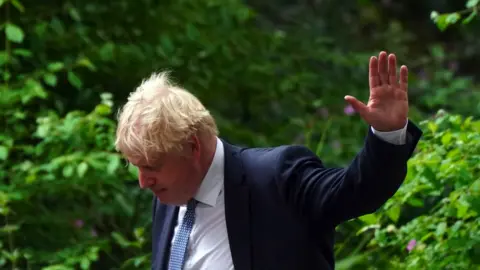Why did Boris Johnson resign?
 PA Media
PA MediaBoris Johnson is stepping down as an MP. It's just under four years since the former PM led the Conservative party to an 80-seat majority - their best result in 30 years.
He left the job of prime minister in 2022, following a mass revolt by ministers over his leadership, sparked by scandals including Partygate.
So why has he decided to resign as an MP?
In his official statement, Mr Johnson said he had decided to step down "for now" after an investigation into the Partygate scandal carried out by the Privileges Committee.
Mr Johnson accused the committee of mounting a "witch hunt" against him, determined to "drive me out of Parliament".
So he decided to jump before he was pushed.
"It is in no one's interest, that the process the committee has launched should continue for a single day further," Mr Johnson said.
And that is why he said he was "stepping down forthwith", triggering an immediate by-election in his Uxbridge and South Ruislip constituency.
The report from the Privileges Committee - written by a cross-party committee of senior MPs - had only been handed to Mr Johnson 24 hours ago.
Under the procedure of the committee, Mr Johnson had two weeks to respond to what is known as a "warning letter" - which sets out criticisms it intends to make of Mr Johnson, along with any evidence which supports them.
Forced out?
The detail of the report remains under wraps but his claim implies that the committee has told him it was likely to recommend he was suspended for 10 or more sitting days.
That would trigger a recall petition in his seat, meaning a possible by-election.
It is important to note that this was a draft report, setting out a likely sanction.
The process of the Privileges Committee is far from over. It was set up by a vote of the House of Commons, not the committee itself, so the report will still be published, as early as next week.
The final recommendation would also have to pass a vote of MPs before it was enacted.
Not out of road
Outside forces could have also influenced Mr Johnson's decision.
As Mr Johnson points out in his letter, the Conservative party are trailing Labour in the polls by an average of 16 points.
If he had decided to stay and fight, there is no guarantee he would have returned to Parliament.
Both Labour and the Liberal Democrats are targeting his former seat of Uxbridge - a marginal with a majority of 7,200.
Mr Johnson was not quite out of road - he just chose to cut his losses and opted not to fight on.

Boris Johnson resigns as MP
- "A dangerous precedent": His resignation statement in full
- Jump before push: Why Johnson resigned now
- Watch: His political career in 72 seconds

